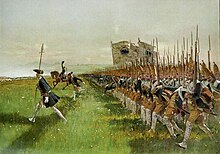Friedrich Christoph von Saldern
Friedrich Christoph von Saldern (born January 2, 1719 in Plattenburg in the Prignitz , † March 14, 1785 in Magdeburg ) was a Prussian general and war theorist.
Life
Origin, beginning of military career
Friedrich Christoph Saldern comes from the old Lower Saxon noble family von Saldern . When he was born in 1719, his father Otto Ludolph von Saldern (born June 26, 1686; † April 5, 1753) was the battalion commander of Kolberg , his mother was Lucrezia Tugendreich von Holtzendorf (1700–1728). After her death, his father married Sophie Wilhemine von Sack (1709–1780), the daughter of the commandant of Kolberg, Siegmund von Sack .
Saldern joined the army in Stettin in 1735 as an ensign in the infantry regiment of Prince von Anhalt-Zerbst, the father of the Russian Empress Catherine II , and was transferred to Potsdam in 1739 because of his height to the so-called Lange Kerls , the Prussian guard regiment . When this was dissolved in the same year in the course of the accession to the throne of Frederick II , he came to the second battalion of the new guard regiment as a premier lieutenant .
Participation in the Silesian Wars

Friedrich Saldern took part in the First Silesian War (1740–1742) and then received command of a company. After the Second Silesian War (1744-1745), where Saldern's company was involved in the siege of Prague and the battles of Hohenfriedberg and Soor , he was promoted to major in 1749.
Seven Years War, disgrace
He fought in almost all the battles of the Seven Years' War , with honors in Leuthen and Hochkirch , and gained the rank of major general on the march from Saxony to Silesia to relieve Neisse. He also proved himself at Liegnitz and Torgau in 1760 with courage and war experience. In the same year he became regiment chief of the Grenadiergarde (No.6) , the former royal regiment "Lange Kerls" Friedrich Wilhelm I. When Friedrich II ordered him to plunder the Hubertusburg Castle in February 1761, Saldern resisted the order and fell by End of war in disgrace. The story of the honorable refusal of orders in front of Hubertusburg is also attributed to Johann Friedrich Adolf von der Marwitz , whose grave inscription became the motto of the assassins on July 20, 1944.
Army inspector and governor of Magdeburg, last years

In 1763 Saldern was entrusted with the post of army inspector for Magdeburg and the Altmark and governor of Magdeburg. In 1766 Frederick II finally appointed him lieutenant general and awarded him the former regiment of Braunschweig on foot and the Order of the Black Eagle . Saldern did an excellent job in the tactical training of the troops, so that he always earned the special recognition of Frederick the Great during the autumn maneuvers . In 1781 his work “Tactical Principles and Instructions for Military Evolutions” and three years later the textbook “Tactics of the Infantry” appeared. As head of the inspection school in Magdeburg he promoted young officers, including the later infantry general Ernst von Rüchel , reformer of the Prussian military education system and one of the losers in the Battle of Jena on October 14, 1806. Saldern died on March 14, 1785 in his Magdeburg garrison.

Prince Heinrich of Prussia dedicated a plaque on his Rheinsberg obelisk to him .
Aftermath
The "Saldern tactics" developed by Saldern are made jointly responsible for the defeat of the Prussian army in the battle of Jena and Auerstedt (1806).
Works
- Tactical principles and instructions for military evolutions (Frankfurt / Leipzig 1781)
- Infantry tactics (Dresden 1784)
family
Saldern was married three times. On June 1, 1748, he married Sophie Antoinette Katharina von Tettau (* 1720, † 1759), a lady in waiting for Queen Elisabeth Christine and daughter of Lieutenant Colonel Carl von Tettau . His second wife was Wilhelmine von Borcke (* April 6, 1742; † May 15, 1766), daughter of the Hessian minister Friedrich Wilhelm von Borcke . The couple married on January 5, 1763. After her death, he married her sister Helene Bernhardine von Borcke on November 22, 1767 (* May 1, 1743; † May 5, 1831). Saldern had two children who died before him.
literature
- Bernhard von Poten : Saldern, Christoph von . In: Allgemeine Deutsche Biographie (ADB). Volume 30, Duncker & Humblot, Leipzig 1890, pp. 211-213.
- Kurt von Priesdorff : Saldern, the drill master of the great king. Hamburg 1943
- Carl Heinrich Goeroldt: History of the sex v. Balances: compiled according to traditional and documented news. Oschersleben 1865, digitized
- Carl Daniel Küster: Character traits of the Prussian Lieutenant General von Saldern with practical remarks about his military deeds and about his private life. With a title copper. Berlin 1793
- Anton Balthasar König : Friedrich Christoph von Saldern . In: Biographical lexicon of all heroes and military people . tape III . Arnold Wever, Berlin 1790, p. 478 ( Friedrich Christoph von Saldern in the Google book search).
Individual evidence
- ↑ http://www.geneall.net/D/per_page.php?id=1834212
- ↑ cf. the references in Friedrich E. Schnapp, Festschrift for Dieter Leuze, Berlin 2003, p. 469 ff.
- ^ Preussische Allgemeine Zeitung : Volume 10 of March 13, 2010 He chose disgrace where obedience did not bring honor
- ↑ geneanet.org: Friedrich Christoph von Saldern
| personal data | |
|---|---|
| SURNAME | Saldern, Friedrich Christoph von |
| BRIEF DESCRIPTION | Prussian general and war theorist |
| DATE OF BIRTH | January 2, 1719 |
| PLACE OF BIRTH | Plattenburg |
| DATE OF DEATH | March 14, 1785 |
| Place of death | Magdeburg |
